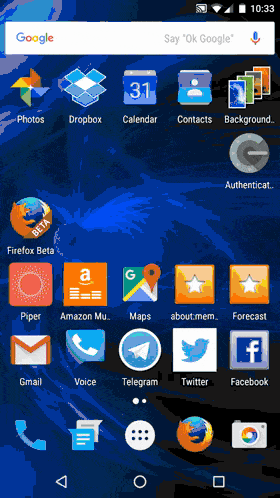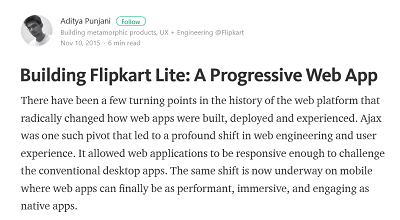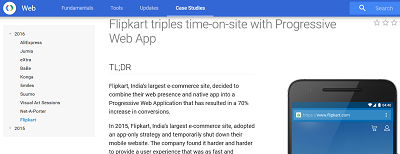Flipkart, Google, and the Web
UPDATE: Please note that Flipkart has since released their product fully on Firefox. While I think their conversion to progressive web apps could have been handled better at the time, it has all worked out well in the end.
This week I vented my frustration on Twitter about what I see as an issue with Flipkart, Google, and maintaining the open web. I want to take this time to elaborate on exactly what I think the problem is.
To start, lets step back and take a look at the situation from an outsider’s point of view. Flipkart introduced their new Progressive Web App (PWA), Flipkart Lite, in November 2015.
This was great news and very exciting. I think everyone was happy to see them back on the web.
It was also clear that the Chrome team had worked hard to get them back. They listened to Flipkart’s concerns and helped build mobile web solutions to solve them. This was also great.
Because of this, however, Google was directly associated with Flipkart’s new site.
Eventually Google began promoting Flipkart Lite directly on their own site.
Again, its great to show the success that companies can achieve by building on the web instead of closed native platforms.
The problem, however, is that Flipkart Lite uses a technique that is very damaging to the health of the web. At the time of launch, users received the following experience if they visited Flipkart Lite in any browser other than Chrome:

Here they are redirecting browsers that are not in their whitelist to the native app Play Store. They are showing zero web content and forcing users to a different application on their device without consent.
This is still the experience users receive today on Firefox (and I believe Edge). This is 7 months after launch.
I believe that this combination:
- The site was developed in collaboration with the majority share browser.
- The site was promoted by the majority share browser as an example that other developers should consider emulating.
- The site uses a technique that is actively hostile to interoperability with other browsers.
- The majority share browser has not included any caveat about avoiding this hostile technique in its promotion of the site.
sends a dangerous, unintended message.
Developers and project managers could easily end up “just doing what Flipkart did” and replicate this redirect to the native store. But what happens when these other sites invariably have budget constraints and only bother with Chrome and Safari?
In that case the web takes a step closer to a siloed ecosystem just like native apps. URL sharing becomes harder. User choice is ignored. New browsers are blocked from entering the market with fresh ideas.
I do, however, think this is an unintended message. I truly believe that the Chrome developers want to see a healthy, open web. I believe them when they say they discouraged Flipkart from using a UA block.
I also believe the Flipkart team when they say they are committed to building for the open web. And to their credit they are on the verge of finally removing the UA block.
These perspectives, however, are all relatively buried. None of the top level announcements or case studies mention any of this. The first blog post mentions Chrome 11 times and no other browser. There are many developers who don’t have the time to attend conferences, watch recorded talks, or monitor the Twitter replies from Google developers.
Google’s Alex Russell believes the web is in crisis and that this means we shouldn’t care how sites are built.
I agree with this to a degree and think the web definitely needs help on mobile. I don’t, however, think that means we should just throw out all the things that make the web great. If we do, what have we saved?
Jason Grigsby points out building PWA sites is a win-win for the web. Either:
- the web is in crisis and we save it, or
- the web is not in crisis and we just make it better
Unfortunately this is only true if people build truly progressive, interoperable PWA sites. In reality there is a third option:
- We build siloed PWAs and lose the benefits of the open web.
I for one think this would be a shame. I think we have to speak out if we see the native app siloed perspective creeping on to the web.


